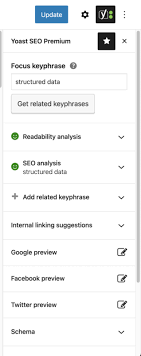
In the digital landscape, Search Engine Optimization (SEO) is a crucial element for businesses looking to enhance their online presence and reach a wider audience. However, simply implementing SEO strategies is not enough; regular SEO analysis is essential to ensure that your efforts are yielding the desired results.
SEO analysis involves evaluating various aspects of your website’s performance in search engine results. It includes assessing keyword rankings, backlink profiles, site speed, mobile-friendliness, and more. By conducting a thorough SEO analysis, you can identify areas for improvement and develop strategies to enhance your website’s visibility and ranking on search engines.
Regular SEO analysis offers several benefits to businesses:
To perform effective SEO analysis, consider the following steps:
In conclusion, SEO analysis is a vital component of any successful digital marketing strategy. By regularly evaluating key metrics and making data-driven decisions, businesses can improve their online visibility, attract more organic traffic, and ultimately achieve their marketing goals. Invest in SEO analysis today to unlock the full potential of your online presence!
Performing keyword research is a fundamental step in effective SEO analysis. By identifying relevant search terms that align with your business and target audience, you can optimise your website content to attract organic traffic and improve your search engine rankings. Understanding the specific keywords that users are searching for allows you to create valuable, targeted content that resonates with your audience and increases the likelihood of driving quality traffic to your site. Keyword research is key to unlocking the potential of your SEO strategy and ensuring that your website is visible to those actively seeking the products or services you offer.
When conducting SEO analysis, it is crucial to thoroughly examine the website structure to ensure it is optimised for search engines. A well-organised and SEO-friendly website structure not only enhances user experience but also makes it easier for search engine crawlers to navigate and index your content effectively. By analysing the website structure and implementing SEO best practices such as clear navigation, logical hierarchy, and strategic use of keywords, businesses can improve their online visibility and rankings in search engine results pages.
Checking for broken links and promptly fixing them is a crucial tip in SEO analysis to enhance user experience on a website. Broken links can frustrate visitors and hinder their navigation, leading to a negative impression of the site. By ensuring all links are functional and directing users to the intended pages, businesses can provide a seamless browsing experience that encourages engagement and boosts credibility. This proactive approach not only benefits user satisfaction but also contributes to improved search engine rankings, highlighting the importance of maintaining a well-functioning link structure for overall website performance.
Monitoring your website loading speed is a critical aspect of SEO analysis. A slow-loading website can deter visitors and negatively impact your search engine rankings. By regularly monitoring your site’s loading speed and making necessary optimizations, such as compressing images, minifying code, and leveraging browser caching, you can improve user experience and boost your site’s performance in search results. Prioritising website speed not only enhances SEO but also ensures a seamless browsing experience for your audience.
Creating high-quality, original content that provides value to users is a fundamental aspect of effective SEO analysis. Search engines prioritise content that is relevant, engaging, and informative for users. By focusing on producing valuable content that meets the needs and interests of your target audience, you not only enhance your website’s visibility in search results but also build credibility and trust with your visitors. This approach not only attracts organic traffic but also encourages user engagement and fosters long-term relationships with your audience.
To enhance your website’s search visibility, it is essential to optimise meta tags, titles, and descriptions. These elements play a crucial role in informing search engines about the content of your web pages. By strategically incorporating relevant keywords and crafting compelling descriptions, you can improve your site’s chances of ranking higher in search results. Optimised meta tags, titles, and descriptions not only attract more clicks from users but also signal to search engines the relevance and quality of your content, ultimately boosting your overall SEO performance.
To enhance the effectiveness of SEO analysis, it is essential to leverage analytics tools that provide valuable insights into website performance. By utilising these tools to track key metrics such as traffic sources, user engagement, and conversion rates, businesses can make informed, data-driven decisions to optimise their SEO strategies. This approach not only helps in identifying areas for improvement but also enables businesses to measure the impact of their efforts accurately, leading to more successful outcomes in the competitive digital landscape.
Regularly auditing your SEO strategies and adapting to algorithm updates is paramount in maintaining a competitive edge in the ever-evolving digital landscape. By conducting frequent assessments of your SEO tactics and staying abreast of algorithm changes, you can ensure that your website remains optimised for search engines and continues to rank well in search results. Flexibility and responsiveness to algorithm updates not only help in preserving your online visibility but also pave the way for sustained growth and success in the dynamic world of digital marketing.